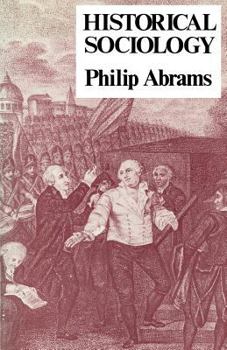Historical Sociology
Select Format
Select Condition 
Book Overview
This book argues that history and sociology share the same vital preoccupation: the desire to unravel the puzzle of human agency. How do large-scale social transformations occur, and what is the role of the individual in them? Phil Abrams devotes three chapters to the development of industrialism and scrutinizes, in that connection, the theories of Marx, Weber, and Durkheim. Subsequent chapters consider Talcott Parsons and the debate on convergence;...
Format:Paperback
Language:English
ISBN:0801492432
ISBN13:9780801492433
Release Date:February 1983
Publisher:Cornell University Press
Length:400 Pages
Weight:1.00 lbs.
Dimensions:0.8" x 5.5" x 8.5"
Age Range:18 years and up
Grade Range:Postsecondary and higher
Customer Reviews
1 rating
Indispensible
Published by Thriftbooks.com User , 23 years ago
Abrams is attempting in Historical Sociology not only to suggest that the disciplines of History and Sociology should move towards eachother methodologically, but to suggest that they are essentially the same subject, and that all good historical writing encompasses not only empirical analysis but also generalised theorising. He does this through building up a complex but logical argument, leaving nothing out, which makes this work a fine example of the style of writing that Abrams is advocating.Abrams argues that most of the sociologist's major problems can only be solved by historical analysis, and that the apparent divide between the two disciplines do not exist, let alone get in the way of this sort of investigation. He talks about the work of some of the great sociologists in an understandable but detailed way - the account of the work of Max Weber is particularly good, if not better than reading the original. Most of the early work of sociologists has concerned the transition of Western Europe from a feudal to and industrial society, and Abrams recognises that there is much historical analysis involved in making sense of these turbulent times, both in terms of methodology and in terms of the use of empirical data. He deals with the problems that historians tend to use the narrative style when describing events, whereas sociologists tend to work from theories and concentrate less on disrete facts be saying that a mixture of the two methods would provide a more sophisticated analysis. The historian's tendency to be specific compared with the sociologist's tendency to generalise must be united, says Abrams.His chapters are well arranged, and the argument flows smoothly throughout, ending with some of the problems of this type of method of conducting historical sociological investigation. Along with the writings of some of the other advocates of such systems, such as Hexter, Kumar, Leff and others, this is an indispensible introduction to the world of historical sociology, suitable for university students upwards. A possible criticism to be levelled at the book (which I consider to be worth mentioning, but to miss the point of such a work) is that Abrams is more concerned with uniting marxist history with marxist sociology (Arthur Marwick), but I don't feel that this is relevant to the work, as Abrams criticises Marx throughout (although obviously he acknowledges the fantastic work produced by Marx in works like "the german ideology"). Well worth buying if you're interested in that sort of thing.




